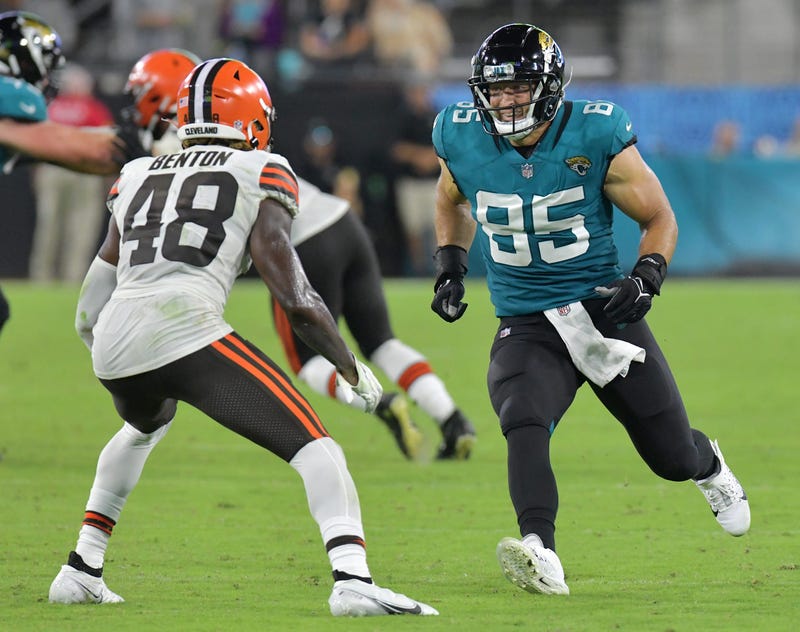
Tim Tebow was a great college football player and a below-average pro. That doesn't make him much different than hundreds of his peers every year. By Labor Day, NFL rosters are cut in half, meaning dozens of players on every team will be out of work. They were all elite college players or they wouldn't have even sniffed a training camp invite. It just so happened that Tebow was a legendary college athlete and perhaps the most famous of the last 25 years. Thus, when Tebow was released this week by the Jacksonville Jaguars on Tuesday, it registered as massive news.
Ordinarily, when a fourth or fifth-string tight end receives his walking papers, no one notices. You could cite the difference with Tebow -- his national titles and Heisman trophy -- but there's plenty of players with those credentials who get dumped. Unlike so many others, Tebow brought with him years of attention, celebrity, and controversy. So when he gets cut, it's different -- much different. And that type of difference is unfortunately the worst part of American culture right now. Everyone is poised in their corners of the ring, ready to start throwing haymakers as soon as the bell sounds.
When Tebow entered the NFL Draft back in 2010, there was an extremely loud portion of the country that predicted he was a can't-miss prospect. As noted, he was a legendary quarterback with the Florida Gators. He was a first-team All-SEC selection three times, a Heisman finalist twice. He was part of two national championships at Florida. He was the SEC's two-time player of the year. He won every significant individual award in 2007.
But as we've been reminded so many times throughout history, greatness in college does not equate to greatness in the pros, and vice versa. Tom Brady and Aaron Rodgers were not otherworldly college quarterbacks, but Doug Flutie, Ty Detmer, Andre Ware, Danny Wuerffel, and Charlie Ward were. However, Tebow's "winning attitude," leadership, and intangibles were always promoted as a separator from other NFL flops. There was no way he could be a bust, his supporters bellowed. He simply wouldn't let it happen. This created a cauldron, where fact diverged from fiction. Rational NFL observers saw a quarterback with a below-average arm, poor footwork, and mediocre mechanics at the next level. His supporters tossed all that out as meaningless because of his inner drive. And it created a battleground over what he was, is, and will be.
Tebow was also handsome, chiseled, and comfortable in front of the camera. He easily spoke about his religion, and that engendered a wave of unending admiration from those who shared his faith. So television networks raced to run stories on him. Websites covered him relentlessly. And his hiccup of a season a decade ago pulled at the "fact vs. fiction" tug-of-war even more. Tebow's stat lines in 2011 were ghastly -- the games where he passed 2-for-8, 9-for-20, or 6-for-22 read like box scores from the 1920s. He threw for less than 70 yards in two different games that season. And yet, he was 7-4 as a starter, and defeated the defending AFC champion Pittsburgh Steelers in the playoffs (on a broken coverage and mind-numbingly stupid call by the Pittsburgh coaches). So, was Tebow horrendous, or a winner?

The football realists saw the facts. He was extremely limited as a quarterback, and this success was fleeting at best, farcical at worst. Tebow acolytes didn't want to hear it. They now had evidence the "experts" were wrong. But the facts against him kept stacking up. The Denver Broncos, noting his league-low completion percentage, his inherent impediments, and persistent turnovers, traded him in the offseason to the New York Jets. The Broncos shopped him across the league and all they could fetch in return was a fourth-round pick. Could 31 other general managers also be wrong? The team Tebow had just led to a playoff win didn't believe in him. The Jets had quarterback issues since Joe Namath retired, yet he threw just eight passes all season. Were they also blind? He bounced around to training camps with the Philadelphia Eagles and New England Patriots in ensuing seasons. He was cut from both. Bill Belichick is widely lauded as the coach who can find a particular skillset better than anyone else in league history. He couldn't find a use for Tebow. Ultimately, there was no place in the NFL for him. Was every single front office missing something?
We universally accept that great college players may not pan out. No one melted down when 2006 Heisman winner Troy Smith couldn't make the NFL. 2001 Heisman winner Eric Crouch is one of three collegiate quarterbacks ever to throw for 4,000 yards and rush for 3,000. Sportstalk radio didn't engulf into flames when he flamed. 2003 Heisman winner Jason White won a national championship at Oklahoma and every major individual award while throwing for 75 touchdowns and just 19 interceptions in his final two seasons. He didn't even get drafted (knee injuries likely scared many away). No one argued over his lack of opportunities.
But Tebow is different. When Jaguars first-year head coach Urban Meyer decided to extend him a training camp invite as a tight end this offseason, the facts were stacked against him even higher. Tebow had no experience playing the position. He's 34 years old. He had spent the last six years alternating between broadcasting and playing minor league baseball (not particularly well). Clearly the odds were exceedingly low that he would make the opening day roster. But when the realists (including yours truly) brought that up, we were shouted down by his sycophants. We were labeled as "haters," people with personal grudges or vendettas against him. Some even claimed it was out of distaste for his faith.
And this is the battleground that America has exhaustingly turned into. Many in the media have turned into a mean-spirited lot, looking for the latest piñata to whack at. It's become theater to sit behind a desk and reverse-engineer an argument around what you want to happen, instead of reacting to what actually did. When Lebron James wins a championship, his most vocal antagonists quickly find something else to focus on. When he loses, those rush to a microphone to take him to task. The audience senses this, and those who agree have their satisfying meal of vitriol for the day. Those who see the hypocrisy lash out in frustration.
So when Tebow got cut, there was an immediate rush to wag fingers at those who would "take glee" in his dismissal. Tebow supporters claimed critics were rooting for him to fail, and celebrating would prove how small and pathetic they were. His entirely predictable fate -- since Meyer couldn't rationalize keeping a 34-year old inexperienced tight end that didn't contribute on special teams -- was a standoff. Two parties standing in the middle of a ring, pointing and jeering at one another. No matter the facts, the water had been poisoned.
The media should be more even-handed and fair-minded, but we've rewarded those who are most reactionary and caustic. The audience should be less obstinate and argumentative, but we've created a culture of social media brawling. We should all open-mindedly absorb facts and come to rational, reasonable conclusions (like Tebow would not make the opening day roster and Meyer's invite could've been used on a legitimate prospect). But that takes patience and occasional discomfort. The truth can be hard, and people don't want hard. They want to tap four buttons and have their dinner delivered in 15 minutes. Tebow was never going to make the Jaguars' roster. But even that simple fact was too complicated for a nation at war with itself.
